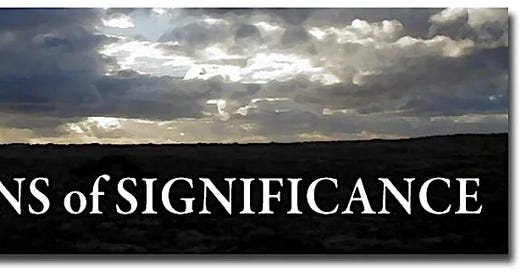Two points:
All that's been covered here so far is preamble.
Disinterested parties provide the most valuable commentary.
The first point aims at the unfinished quality of what has appeared here.
The second hints at why this is important.
We are conditioned to strive. One of the things we strive after most diligently is meaning. Even those who might seem least likely to care about meaning are and have striven to accommodate a jumble of notions and adapt them as their meaning. Denial and anger defend these positions when all else fails.
Due to this striving after meaning we also strive after leadership. One of the tags I used here early on was "the crisis of leadership."
This tag has fallen by the wayside because I no longer believe leadership is in crisis. I believe that our insistence on leaders is a symptom of our incoherence.
This brings us to the fool. The fool may speak wisely, but no one thinks to raise him up as a leader.
This is a useful talent, especially if one is working to disentangle one's self from the leadership mania, either looking for one or considering becoming one.
This may sound like classic anarchism. That is mostly because of the straightforward delineation of points as though in a proof.
Geometry was always my favorite math. It didn't require much arithmetic and it celebrated logic.
The trouble comes when its simplicity is expected to translate into the wider world. It is, in its crystalline perfection, only a fragmentary approach to reality.
Taking logic too far leads to all sorts of isms. They all then assume there will be leaders. Even the ones that insist there are none!
The fool is outside of the ladder of success. No chance of his ascending the throne!
This makes him disinterested. He can – it would be good to have some examples brought to mind of she-fools! – follow the myriad twists and turns of perception, language, and insight where they may go. He has no "skin in the game," to use that horrible sports/corporate/macho bullshit label!
This makes his pronouncements as likely as any to be of value. It also pushes him out of contention even further – see the skin-in-the-game logic for why this might be.
To lead requires confidence! What does this entail? What is this confidence made of?
Self-delusion. The belief that what one wants is good for all. This is a lie believed by the liar. The most dangerous kind! Read Mein Kampf for Hitler's advice on becoming a more accomplished and effective liar….
It is also a belief in means justifying ends. The good is worth the violence and deceit required to carry it out.
We never leave the realm of negotiation.
The fool nicely sidesteps all this.
From the point of view of leadership he is a failure. He does not build coalitions. He doesn't convince. He doesn't smite his adversaries, beyond the spells of language within barbed wit, the kind of spell that – ignored by the powerful – might actually have an effect to change things beyond the level of the status quo…
But then, the fool is also vulnerable. Not only apparently. He has no power. He exists at the whim of the powerful and they are – as he is most likely to know – a pitiless and ruthless lot.
Then again, this dwelling in vulnerability – when it doesn't turn him into the embittered revenge-seeking sort that fills literature written from within the perspective of leaders and power, those who know of no other possible way to exist and thus must turn even our hero, er fool, into a broken one of them. Dwelling within vulnerability is actually the healthiest way to be. The most honest. The way that is most likely, or least likely to prevent, one's ability to maintain contact with being.
Now, from the other side…. What if we look at the fool from within, instead of how he appears to others?
If he is caught-up in the wisdom trade. If he begins to believe that perhaps he really is a hidden form of leader, that what he is discovering is a new path to power, and to some kind of salvation that sidesteps the curses brought on by every other sort. If he falls for this then, he loses. He loses the only thing he ever had.
If!
If we lived…
If this were a society that valued what was important…
But we don't. So, playing at what-if is just another dodge, isn't it?
In this society to be the fool is to remain within the fool's domain.
Here is another way to look at Krishnamurti's question to Bohm,
"What do we have to offer?"
His own response, the one Bohm was unable to get beyond was,
"Loneliness."
The fool lives that loneliness. It isn't romantic. It isn't heroic.
It also isn't pathetic, or really, that bad at all!
But only when there has been an acceptance of what the position entails. Only when some level of proprioception has taken root to counter the corrosive effects of unacknowledged shadows, of the damage within projections taken to be real.
The fool is also a performer…




